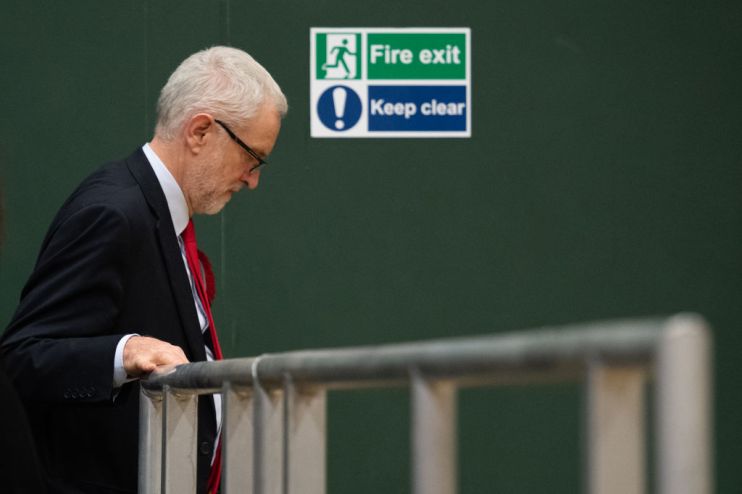This iteration of Labour has no chance of ever winning an election again

“‘Winning’ is the small bit that matters to political elites who want to keep power themselves.”
These words, tweeted in July 2016 by Corbynista activist Jon Lansman, summarise with chilling clarity the state in which Labour now finds itself.
Still reeling from its worst election result since 1935, the buoyancy of the Labour campaign has descended into a scramble.
Why did the cultish appeal of Jeremy Corbyn in 2015 disintegrate so spectacularly? How could a gaffe-prone, media-dodging Tory Prime Minister redraw the electoral map and turn vast swathes of Labour-land blue? Why didn’t the constant refrain that the Conservatives would sell the NHS to Donald Trump scare voters into Labour’s arms?
It will take a generation to fully work out what went wrong, but for now, Labour has just one question to answer: where does it go from here?
You might have thought that an electoral defeat of this scale would necessitate some full-on existential soul-searching and a top-to-bottom rethink of the party’s agenda.
Worryingly — for anyone who supports Labour or who simply believes in the importance of a robust opposition — such contemplation has not been forthcoming.
In a rambling post-election op-ed for The Observer, Corbyn barely even acknowledged that Labour had lost. It took him until the penultimate paragraph to finally admit “we have suffered a heavy defeat, and I take my responsibility for it”.
And that was after naming a plethora of other culprits: Conservative falsehoods, confusion about Brexit, and attacks from the billionaire-funded media.
Nowhere does he accept how his personal unpopularity repelled voters, even as dozens of Labour candidates and campaigners are coming forward now to share their conversations on the doorstep with former supporters who could not stomach the thought of the party leader heading to Downing Street.
John McDonnell, who has announced that he will stand down as shadow chancellor, has taken a clearer-eyed view. On the Andrew Marr Show yesterday, he admitted: “I own this disaster…. If anyone’s to blame it is me. Full stop.”
This has been taken as an attempt by McDonnell to fall on his own sword as the clique that Corbyn has spent four years building turns on its former superstar.
Already, there are whispers of behind-the-scenes Labour heavyweight Karie Murphy and trade unionist Len McLuskey, until Friday two of Corbyn’s top cheerleaders, hatching a plan to lay the blame squarely on their erstwhile idol.
Why? Because the operation to replace him with a “Continuity Corbyn” candidate has already begun.
What Corbyn’s op-ed, McDonnell’s interview, and the Murphy-McLuskey rumours have in common is that their fingers all point away from the car crash that was the Labour platform itself.
While beyond the party jokes have been flying about Michael Foot’s doomed 1983 manifesto now being only the second longest suicide note in history (Labour lost 45 seats then, compared to 59 this time), those within seem blind to how disastrously their offering landed.
Free broadband, mass renationalisation, attacks on business and the City, and eye-watering spending splurges all failed to have the desired impact.
Maybe the electorate saw through the dodgy number-crunching. Maybe voters understood that ending austerity and investing in public services didn’t have to mean a giant power-grab by the state. Maybe most people — the vast majority of whom work in the private sector — don’t have the same visceral distrust of business, profit, and the drive for success that the Labour agenda assumed.
Yet there is a kind of collective delusion at the top of Labour that the policies themselves were not the problem. Read Corbyn’s op-ed (“We have won the arguments… our policies are popular”) and you would think that the small matter of losing the actual election was barely worth mentioning.
McDonnell, meanwhile, has tipped shadow business secretary and faithful Corbyn ally Rebecca Long-Bailey as the next leader.
She is, according to reports, the favoured successor for Murphy and McLuskey too, and enjoys the support of the far-left Momentum group that kept Corbyn-mania raging — even as he steadily lost the trust of Labour MPs.
In fact, the whispers of Long-Bailey paving the way for “Corbynism without Corbyn” have been rustling long before this election was even called. Like him, she is considered to favour maintaining the purity of a socialist project over the messy business of actually presenting a winnable election offering.
Labour does not have to go down this road. It has talented, pragmatic MPs who can help it escape from its echo chamber. Jess Phillips is a firebrand who has been standing up against Corbynism for years, at great personal cost, while Yvette Cooper served under two Labour Prime Ministers (back when such a thing existed) and would bring two decades of parliamentary experience to the party leadership.
It is clearly going to take years for Labour to recover from such a staggering defeat. But it cannot even begin that journey until the party recognises one fundamental fact: in politics, “winning” is not a secondary priority, to be pushed aside in favour of ideological purity.
Winning is, in fact, all that matters. It is the height of elitism to claim otherwise. And a party that doesn’t understand that has no chance of ever winning again.
Main image credit: Getty